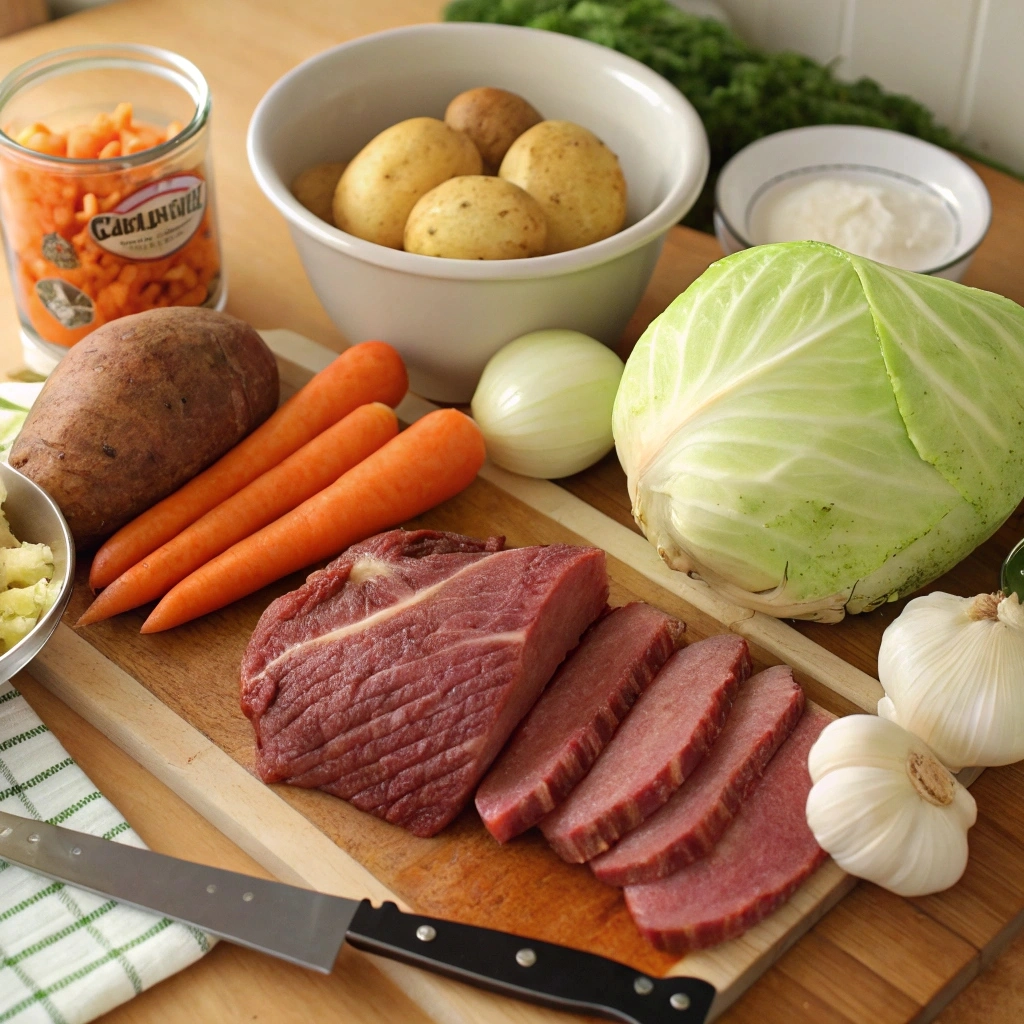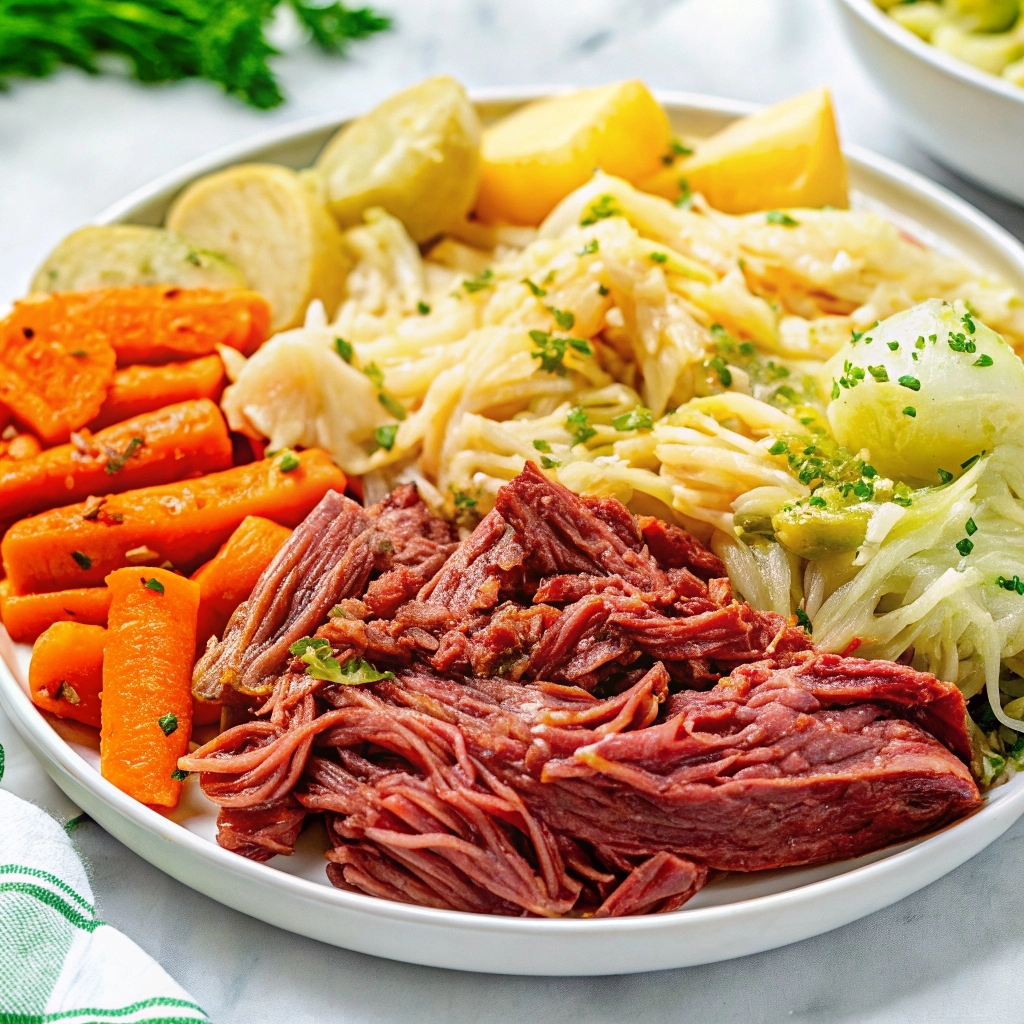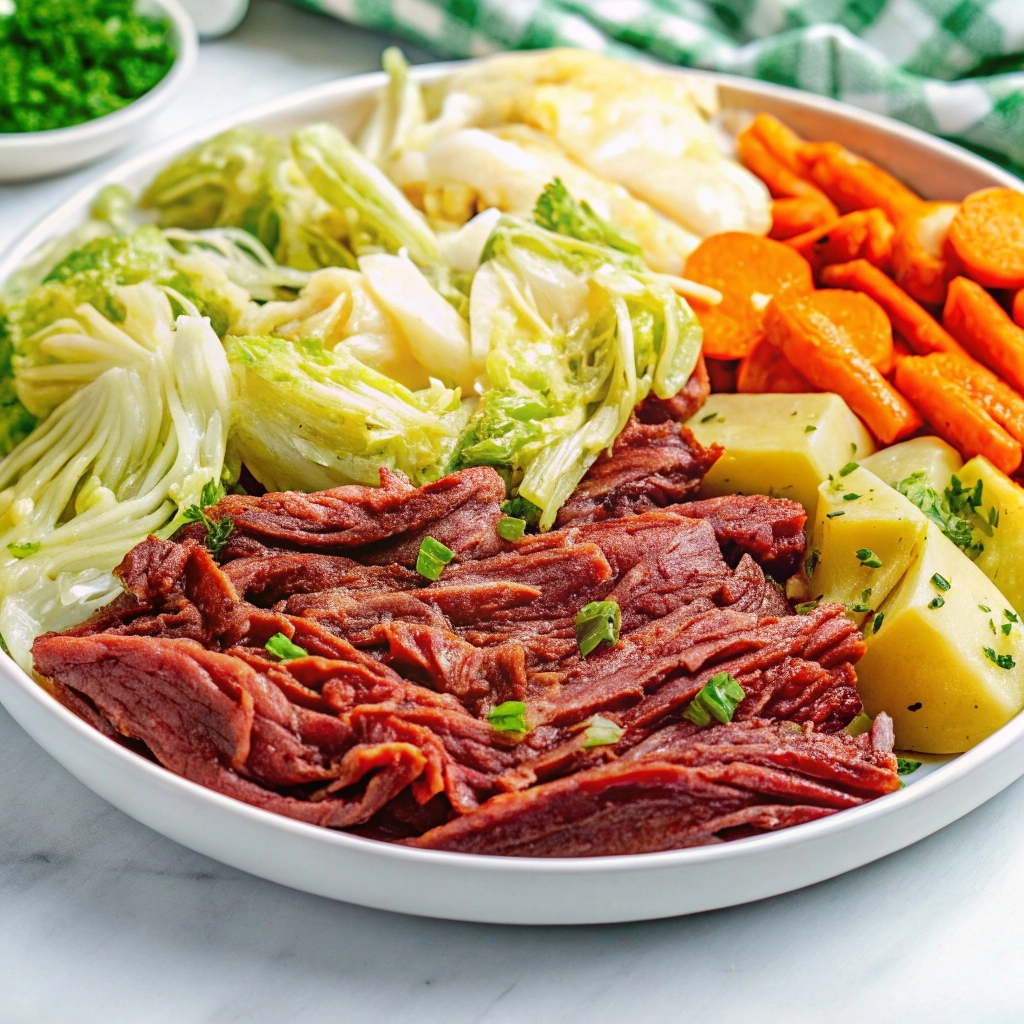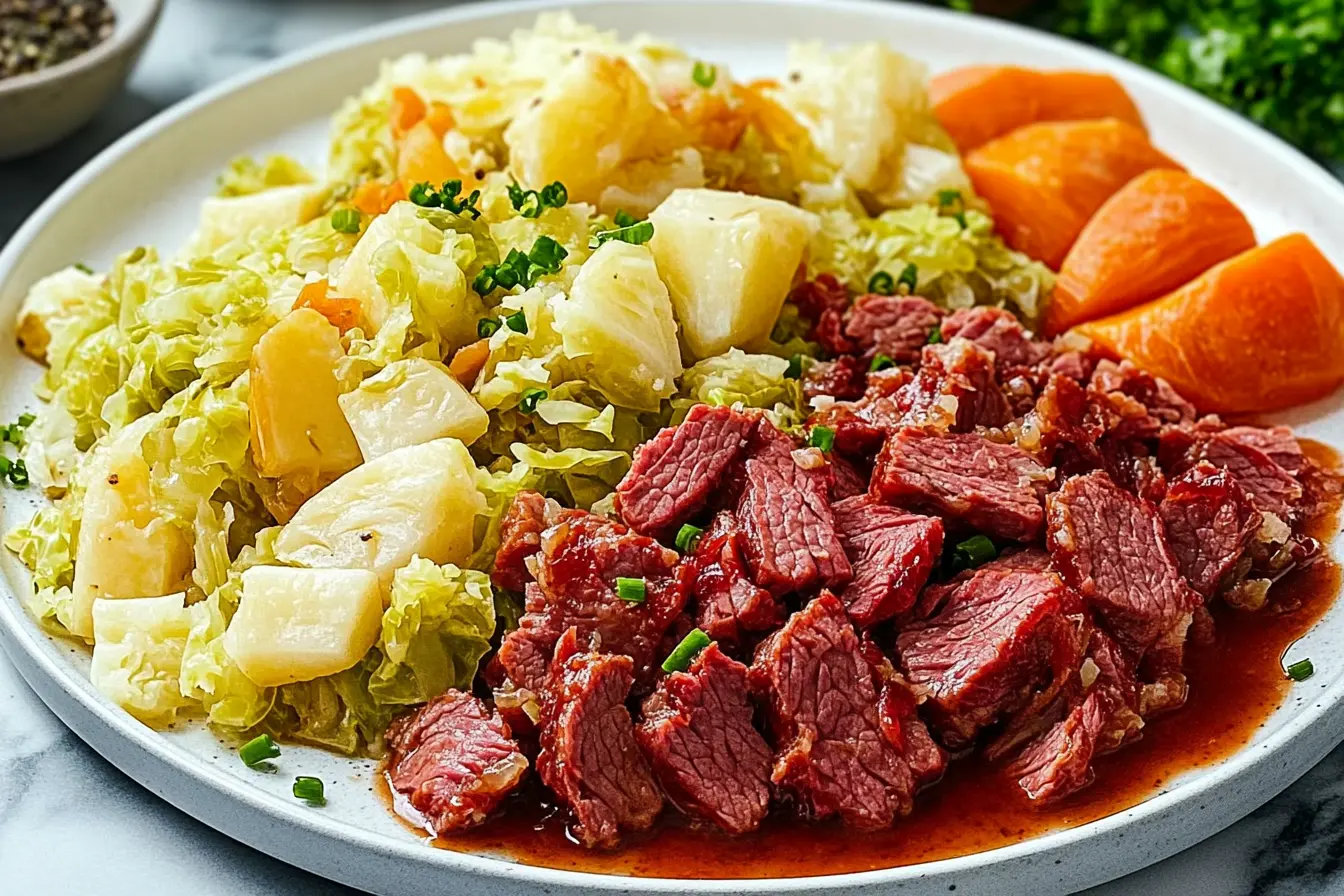Selecting & Preparing the Beef
Choosing the right brisket cut and handling the curing process are crucial for melt‑in‑your‑mouth results.
- Cut options
- Flat‑cut brisket: leaner, uniform thickness
- Point‑cut brisket: more marbling, richer flavor
- Brine essentials
- Store‑bought spice packets vs. homemade brine
- Key pickling spices: mustard seeds, coriander, bay leaves, peppercorns
- Pre‑soaking tips
- Rinse the packaged corned beef to remove excess salt
- Soak in cold water for 30 minutes if you prefer milder seasoning
Explore the origins and brining process of corned beef
Ingredients & Spice Packet Explained
To assemble the ultimate Corned beef and cabbage recipe, gather:
- Meat: 3–4 lb corned beef brisket (with spice packet)
- Vegetables:
- 1 head cabbage, cut into wedges
- 6 small potatoes, halved
- 4 large carrots, peeled and cut into chunks
- 1 large onion, quartered
- Liquids & flavorings:
- Water or low‑sodium broth to cover
- Optional: 1 bottle of stout beer for depth
- Pickling spices (if homemade):
- 1 Tbsp mustard seeds
- 1 Tbsp coriander seeds
- 1 Tbsp whole peppercorns
- 2 bay leaves

Equipment & Tools
While you can adapt to what you have, these make the process seamless:
- Dutch oven or heavy‑bottomed pot
- Slow cooker or Instant Pot (for hands‑off cooking)
- Oven‑safe roasting pan (if braising in the oven)
- A meat thermometer for perfect doneness
- Sharp chef’s knife and sturdy cutting board
Overview of Cooking Methods
There are three popular ways to prepare this hearty one‑pot meal:
- Traditional Stovetop
- Quick to start; requires occasional skimming
- Allows tight control over simmering
- Slow Cooker
- Set‑and‑forget; ideal for busy days
- Yields ultra‑tender meat over 6–8 hours on LOW
- Oven‑Baked
- Braise brisket in its juices at 325°F
- Adds caramelization when uncovered at the end
Each method delivers succulent corned beef and vibrant vegetables—you’ll choose based on time, convenience, and desired texture.
Traditional Stovetop Method – Step‑by‑Step
- Prepare the pot
- Place brisket in a large Dutch oven; add spice packet
- Cover with water or broth, bring to a gentle boil
- Skim foam and impurities for clear cooking liquid
- Simmer the beef
- Reduce to low heat; maintain a bare simmer (180–190°F)
- Cook 2½–3 hours for flat‑cut, 3–3½ hours for point‑cut
- Add root vegetables
- After meat is partially tender (about 1½ hours), add potatoes and carrots
- Continue cooking until veggies are fork‑tender
- Finish with cabbage
- Nestle cabbage wedges into the simmering liquid
- Cook 15–20 minutes more, just until cabbage is bright and tender
- Rest & slice
- Remove brisket; tent with foil and let rest 10 minutes
- Carve against the grain into ¼‑inch slices
- Arrange on a platter with vegetables piled alongside

Slow Cooker & Oven Methods – Step‑by‑Step
Slow Cooker
- Layer ingredients: Place onions on the bottom, then brisket, vegetables, and spices
- Liquid ratio: Add enough water/broth to cover halfway—don’t submerge vegetables entirely
- Cook time: 8 hours on LOW or 4 hours on HIGH
- Finish: Remove lid in the last 30 minutes to concentrate flavors
Oven‑Baked
- Preheat: 325°F (160°C)
- Braise: Combine ingredients in a covered roasting pan; bake 3 hours
- Uncover: Last 20 minutes for a light crust on the meat’s exterior
- Check doneness: Meat should register 195–205°F for optimal tenderness
Vegetables Preparation: Potatoes, Carrots & Cabbage
- Potatoes:
- Choose uniform, waxy varieties (Yukon Gold or red) for even cooking
- Halve or quarter to match carrot size
- Carrots:
- Peel and slice on the bias for better presentation
- Bulk up the pot—they soak up the braising liquid’s flavor
- Cabbage:
- Use firm, fresh heads; cut into 6–8 wedges
- Rinse between layers to remove grit
- Flavor boost:
- Swap half the water for beer or apple cider
- Add a splash of vinegar or a pinch of brown sugar to balance
Resting, Carving & Presentation
- Resting retains juices: tent brisket with foil for 10–15 minutes
- Carving:
- Slice against the grain to shorten muscle fibers
- Aim for consistent ¼‑inch slices for both tenderness and aesthetics
- Plating ideas:
- Family‑style: meat on a platter, vegetables piled high
- Individual plates: meat slices fanned alongside colorful veg
- Garnish with fresh parsley for a pop of green
Variations & Serving Suggestions
- Sauces & dips:
- Creamy Dijon‑horseradish sauce
- Tangy mustard vinaigrette
- Additional veggies:
- Turnips, rutabagas, parsnips for root‑vegetable medley
- Leftover ideas:
- Reuben sandwiches with sliced corned beef, Swiss cheese, sauerkraut
- Hearty corned beef hash with fried eggs
- Beverage pairings:
- Guinness or Irish stout for true pub‑style authenticity
- Crisp hard cider to cut through richness
Tips, Troubleshooting, Storing & Reheating
- Avoid over‑boiling: a gentle simmer keeps meat tender, cabbage bright
- Tough meat?
- Continue simmering, or slice and return to the liquid to finish cooking
- Mushy cabbage?
- Add cabbage in the last 15–20 minutes only
- Storing leftovers:
- Refrigerate in airtight containers up to 4 days
- Freeze in portions for up to 3 months
- Reheating:
- Warm gently in a covered pan with a splash of broth
- Or bake at 325°F, covered, until heated through

FAQs
- What’s the ideal cooking time for corned beef?
- Plan 50 minutes per pound on the stovetop at a gentle simmer.
- Can I skip the spice packet and make my own?
- Absolutely—combine mustard seeds, coriander, peppercorns, and bay leaves in a cheesecloth sachet.
- How do I prevent cabbage from turning gray?
- Add it late in cooking; avoid over‑simmering, which causes discoloration.
- Is it better to brine at home or use store‑bought corned beef?
- Store‑bought is convenient and well‑seasoned; homemade brine lets you control salt and spice levels.
- Can this recipe be scaled for a large gathering?
- Yes—use multiple pots or a large roaster; keep the meat submerged and adjust cooking time accordingly.
Conclusion
Whether you’re seeking a soul‑warming family dinner, this Corned beef and cabbage recipe delivers both simplicity and depth of flavor. From selecting the perfect brisket to mastering your favorite cooking method—stovetop, slow cooker, or oven you now have every tool to create a memorable meal. Embrace the timeless tradition, experiment with variations, and savor every forkful of tender meat and vibrant vegetables.


2 thoughts on “Irresistible Traditional Corned Beef and Cabbage Recipe: Classic Irish Comfort Food”